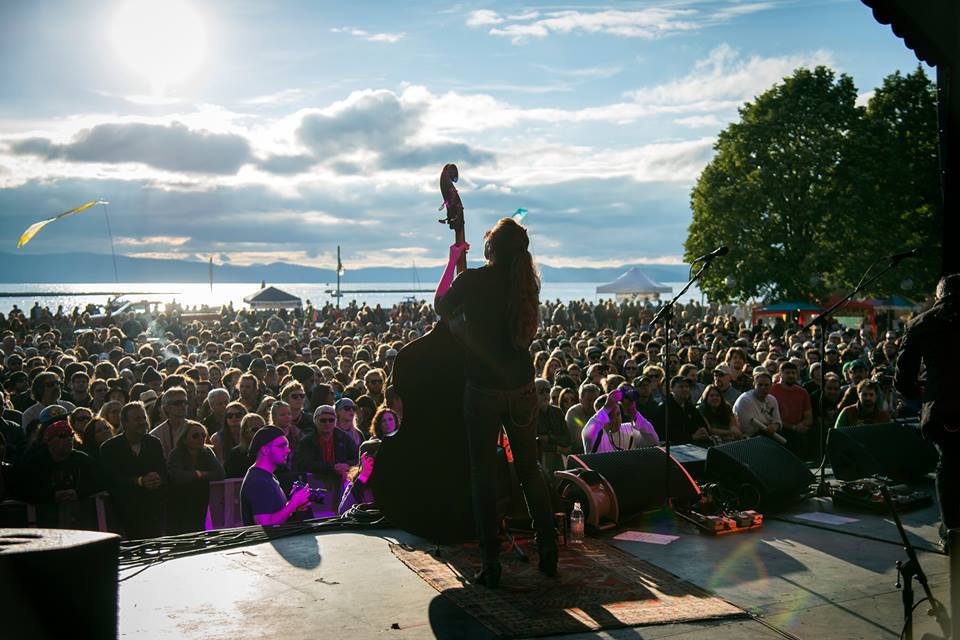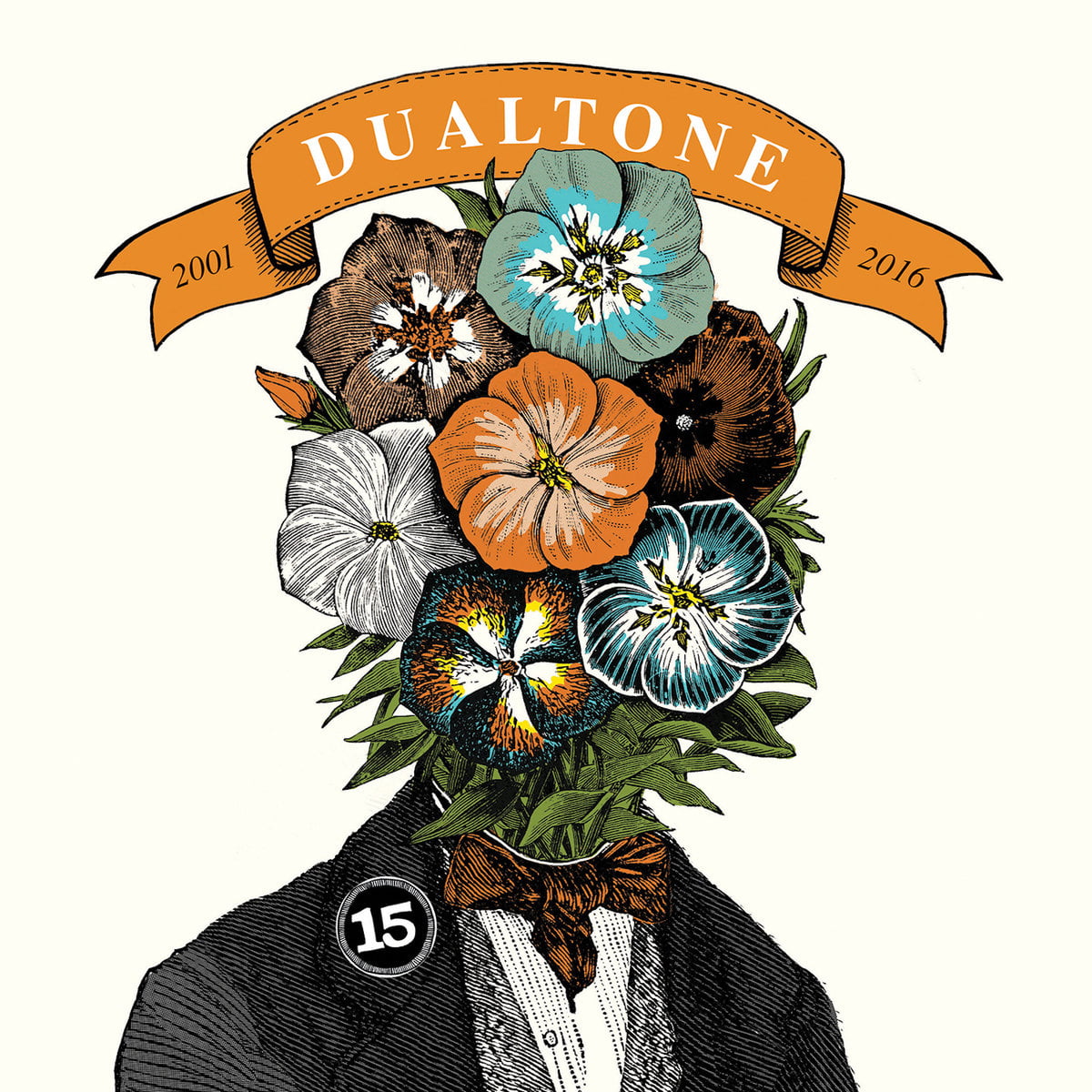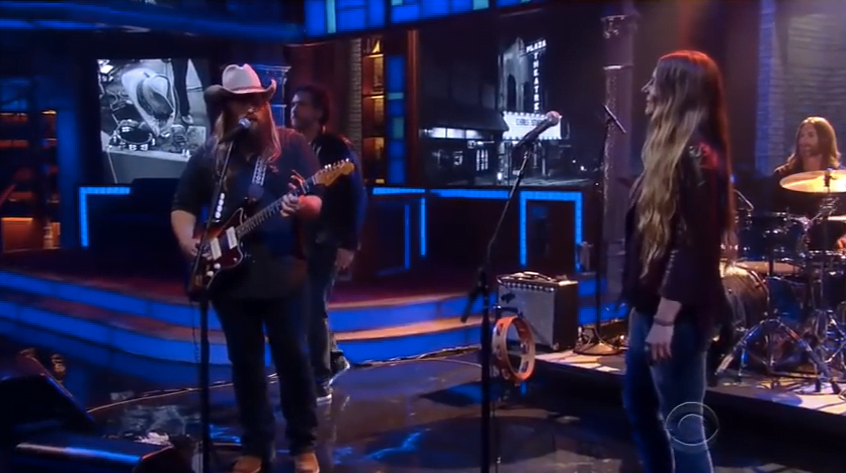Tag: Shakey Graves
Best of: Austin City Limits
As the longest-running music program in television history, PBS’s Austin City Limits holds a very special place in music history. While the show was originally developed by Bill Arhos, Paul Bosner, and Bruce Scafe to feature the thriving music scene in Austin, Texas, it is now famous for bringing a wide variety of musical genres into American living rooms each week. The Rock and Roll Hall of Fame Library and Archive is busy preserving 40-plus years of ACL footage, but here are five of our favorite performances you don’t want to miss:
Willie Nelson — “Bloody Mary Morning”
Let’s start where it all began! Willie Nelson made quite an impression on viewers and PBS, when he starred in the first episode of ACL recorded back in October 1974. We have him to thank for helping the show become the staple of music television it is today.
Shovels & Rope — “Bad Luck”
Husband-and-wife duo Michael Trent and Cary Ann Hearst give their all in this high-energy performance of “Bad Luck.” We think you’ll agree that the sped-up tempo of this live version makes it even better than the original studio recording. We can’t help but move along to the driving beat!
Rhiannon Giddens — “Julie”
In this web exclusive performance of her song “Julie,” Rhiannon Giddens breathes to life a conversation between a slave and her mistress during the Civil War, demonstrating her investment in the rich and complicated history of the South, as well as her enchanting storytelling abilities.
Shakey Graves — “Roll the Bones”
Austin native Alejandro Rose-Garcia, known professionally as Shakey Graves, exemplifies the wealth of hard-working musicians coming out of the Live Music Capital of the World today. For his ACL debut, Graves took to the stage with his electric guitar, suitcase kick-drum, and gritty voice for this crowd pleasing performance of “Roll the Bones.”
Sturgill Simpson — “I’d Have to Be Crazy”
It is only fitting to end with Sturgill Simpson’s cover of Willie Nelson’s “I’d Have to Be Crazy.” Simpson’s endearing demeanor and country twang do wonders in this tribute to the ACL Hall of Famer.
Dualtone Records Reflects on 15 Years of Music
Since 2001, Nashville's Dualtone Records has established itself as a major player in the independent music scene. Over the course of their 15 years in business, the label has released albums from legends like June Carter Cash and Guy Clark, while discovering and championing new artists like the Lumineers and, most recently, new signees the Wild Reeds. To celebrate its 15th anniversary, the label recently released In Case You Missed It: 15 Years of Dualtone, a compilation featuring rare and unreleased tracks from a diverse group of artists on their roster.
"As we’ve thought about ways to commemorate the anniversary and look back on everything that’s gone down the past 15 years, we wanted to shine a light on some tracks that hadn’t necessarily gotten their fair shake in the mainstream," Dualtone President Paul Roper says. "We dug through the catalog and found some songs that we loved for one reason or another and threw them on a record together. We tried to focus on putting some unreleased content on there. You have some new tracks from Shakey Graves and the Lumineers and Ivan & Alyosha and Langhorne Slim, combined with some of our favorite songs that are in the catalog that didn’t really get heard. It was our opportunity to look at the breadth of the catalog."
In addition to the artists Roper mentions, the compilation includes cuts from June Carter Cash ("Keep on the Sunny Side"), whose Dualtone project, Wildwood Flower, would be her last before unexpectedly passing away in 2003, and Guy Clark ("My Favorite Picture of You"), who won his first Grammy for work he did with the label. "It was the first time in his career," Roper says of Clark's Grammy win. "I think he’d been nominated maybe six or seven times throughout his career and hadn’t won one until we put out My Favorite Picture of You. And that was his last album that he released. And we won a Grammy for Best Folk Album. That was a great moment for him in the twilight of his career, kind of a great bookend for his life and his career and his music."
As for that album from Carter Cash, it featured some of the last recordings between June and husband Johnny, and earned the label two additional Grammy Awards. "We took down some of the giants," Roper says. "Some of the major labels were our competition, because she won for Best Female Country Vocal Performance."
Though the David to a major label's Goliath, you also can't talk about Dualtone without talking about another musical giant — the Lumineers, the Denver indie folk band best known for their 2012 breakout single "Ho Hey." "Delivering the Lumineers the first time around was just a whirlwind, with things happening so fast," Roper says. "I don’t know if any of us had a moment to take in what was really going down. But delivering the second record, Cleopatra, and having it go number one — which was the first number one for a debut album that we’ve ever had from a sales standpoint for first week — was pretty awesome and it was great validation for the company. You hear a lot of noise about how anybody can get lucky one time, you know, but when you deliver the sophomore record and it’s received to such great acclaim from the industry and from fans and has continued to have an incredible life, that’s a great moment."
While Roper and his colleagues at Dualtone have spent a good deal of time reflecting on the label's past, they've also been looking to the future. Two recent signings include the Wild Reeds, an emerging Americana band from Los Angeles, and Chuck Berry, a household name and legendary musician who, at 90, is still putting out new music. "We have a deal going with Chuck Berry and his estate and announced on his 90th birthday that a record’s coming," Roper says. "That was a really fun moment, just to see all of the pickup from the announcement. It was everywhere. It’s been an exciting vision of what’s to come with that project. It’s a really special body of work, too. "
As for the direction of the label, Roper hopes to continue to run a company driven by a love for music and a passion for helping artists bring their work into the world. "We want to continue to be in a position to help artists build careers," he says. "That’s the underlying philosophy of the company. As the industry transitions and changes — it’s probably going to change another five different ways, at least, in the next six months — it’s always evolving and we have to be able to adapt and change with it. I think the idea of a label is constantly evolving. What we do know is that artists are going to need a team around them, whatever that looks like. We like to think of ourselves as partners with our artists and not so much the label. We try to be in the position where we add value to artists’ careers."
Finding Your Folks the Festival Way
Last July, Brandi Carlile stood on a hand-built timber frame stage at the annual FloydFest music and arts festival. Before launching into the next song in her set, she pitched her guitar over her shoulder and stepped up to the microphone. “Our music wouldn’t exist without these mountains,” she announced to a roaring crowd.
Carlile’s brand of powerful folk-rock does find its origins in the bluegrass and old-time music harvested in the Blue Ridge Mountains, which encircle the festival grounds. Perched high above the crowd, they provide the backdrop for this idyllic musical playground nestled deep in the foothills of Southwest Virginia. Since the 18th century, Appalachia has been a melting pot of Native American music, spirituals, gospel music, and fiddle tunes. By tapping into the roots of the region, FloydFest co-founders Kris Hodges and Erika Johnson have cultivated a rare environment that’s all spirit and diversity.
“It's not just about, you know, throwing together the most popular bands and hoping for the best with a bunch of drugs,” Hodges says. “We wanted a more holistic lifestyle. We wanted to introduce the regular person into conscious living, and that was really the initial vision and intent behind FloydFest.”
Hodges and Johnson, along with their production company, Across the Way, have been improving upon FloydFest since its inception in 2002, finding new ways to connect with the community and pay homage to its rich heritage.

“People were saying, ‘Well you need to get this band,’ and they were just throwing out all these jam bands cause the jam band thing was really on the move. We're like, 'No. Look where we are. We're in the Appalachias,'” Hodges remembers. “And so that was always a huge part of what we were trying to create. We wanted to make an authentic event that was geographically relevant.”
Cue the Virginia Folklife Workshop Porch, which has become one of the most treasured stages of the festival. With a façade that looks like a front porch, it harkens back to the long-standing tradition of pickin’ parties. It’s where big-name acts play stripped-down versions of songs, tell stories, and host a Q&A session before their headlining set on the main stage.
“Every stage is a different experience and that's the idea,” Hodges explains. “The workshop porch definitely represents that: Let's bring it back home and let's get intimate here; let's actually truly engage with the artist. It's not just there's an artist on stage — but they're a part of the festival. We're all the same, we're all equals, and we all inspire each other so the porch is definitely a launching pad for that.”
FloydFest newcomer Shakey Graves got a taste of this homegrown feeling when he made his debut on the Workshop Porch this year.
“When it really comes down to stuff like this, the people are people and it’s really more about the community,” he said. “It’s really nice to come home to a festival like this. It’s not lost on me and it means a lot.”
Another way FloydFest promoters stay true is by making use of patron feedback. They painstakingly comb through every survey and social media comment made by attendees, doing what they can to incorporate suggestions. In 2015, they responded to patrons’ requests for more female performers by presenting a female-topped bill. In addition to Carlile, headliners included country legend Emmylou Harris and rock ‘n’ roll powerhouse Grace Potter.
“I think FloydFest really prides itself on the intimacy of the festival and the personal experience,” Potter says. “It's about feeling not like 'We built this city and we're all living in it and we're all just like ants on the anthill,' but feeling like we all have our own anthills that have all come together in this beautiful colony that is this music festival for these two or three days.”
It’s the same model of audience engagement and participation that Potter brought to the table in 2011 when she launched her own festival, Grand Point North. Taking place at Burlington’s Waterfront Park in her home state of Vermont, Grand Point North was a long time coming. “I've always dreamt of starting my own music festival,” she says. “My sister and I used to sit around and draw pictures of what we thought it would look like when we were kids.”

No stranger to the festival circuit, Potter’s made the rounds for the better part of 10 years, lending a veteran perspective. “I think I have a platform and I have an individual voice. And I've seen so many music festivals: I've seen the good, the bad, and the ugly,” she says. “So I can potentially advise on this and create a really cool situation — even if it's just one weekend a year — that would be powerful for people.”
For Potter, the festival is a way to embrace social awareness. She describes how her childhood growing up in Waitsfield, Vermont, inspired her vision. “There were farmers' markets every weekend and we could go out. You'd see Phish concerts and, even as a young kid, I felt safe in those environments. I didn't feel like it was like a scene that I was wandering into the middle of,” she reminisces. “It's this feeling of 'I've arrived; I'm with my people. This is my tribe.'”
For this year’s event, Potter and her sister reached out to Vermont’s Governor’s Institute on the Arts in order to identify area youth that may be interested in getting involved. And it was through the Institute that she connected with another tribe. “We tapped into the Abenaki tribe which is actually the indigenous tribe to the Winooski River in Vermont,” Potter explains. “So we’ve been in touch with the tribe itself and we’re gonna record a woman telling the story of the land and describing the relationship between the land, the people, and the lake of Lake Champlain where the festival takes place.”
Fostering relationships and championing a region’s natural elements are key to developing the special quality that’s unique to smaller, grassroots festivals. Even FloydFest’s theme this year — “A Tribe Called FloydFest” — was accompanied by the mantra: “Find your tribe, y’all. And love them hard.”
“Our intention is definitely providing a heart space for people to enjoy each other in a diverse setting that is healthy and supportive,” FloydFest’s Kris Hodges says. “And as a rock 'n' roller, of course, you know, we wanna share that with as many people as possible.”
Photos courtesy of FloydFest and Grand Point North
Watch Chris Stapleton Perform “Nobody to Blame” on The Late Show
Stephen Colbert is early in his tenure as the new host of The Late Show, but he's already had some impressive musical guests. Perhaps the best so far has been Chris Stapleton, who took to Colbert's stage to play "Nobody to Blame" off his excellent recent album Traveller. Watch it below.
Other Roots Music News:
• We normally don't cover prog rock, but we'll make an exception in the case of THE POPE.
• ICYMI: Father John Misty is a strange, amazing man.
• Bob Dylan is releasing a ginormous box set.
• Read Nashville Scene's cover story on Jason Isbell.
• Rhiannon Giddens, Patty Griffin and Shakey Graves… how's that for a conversation trio?
• Danny Barnes won the Steve Martin Prize for Excellence in Banjo and Bluegrass.




